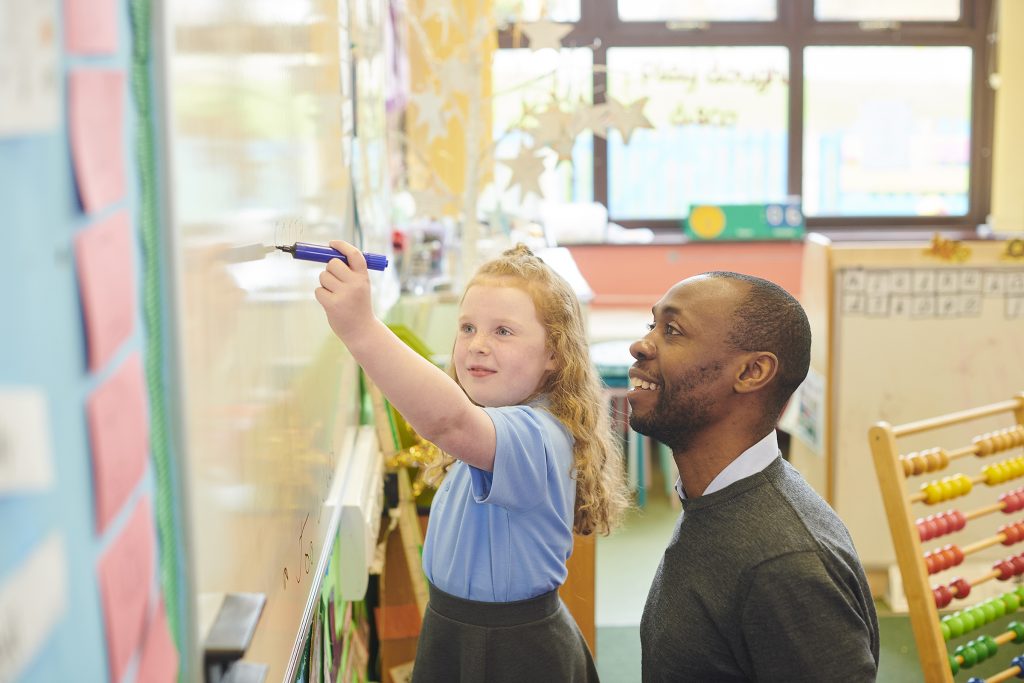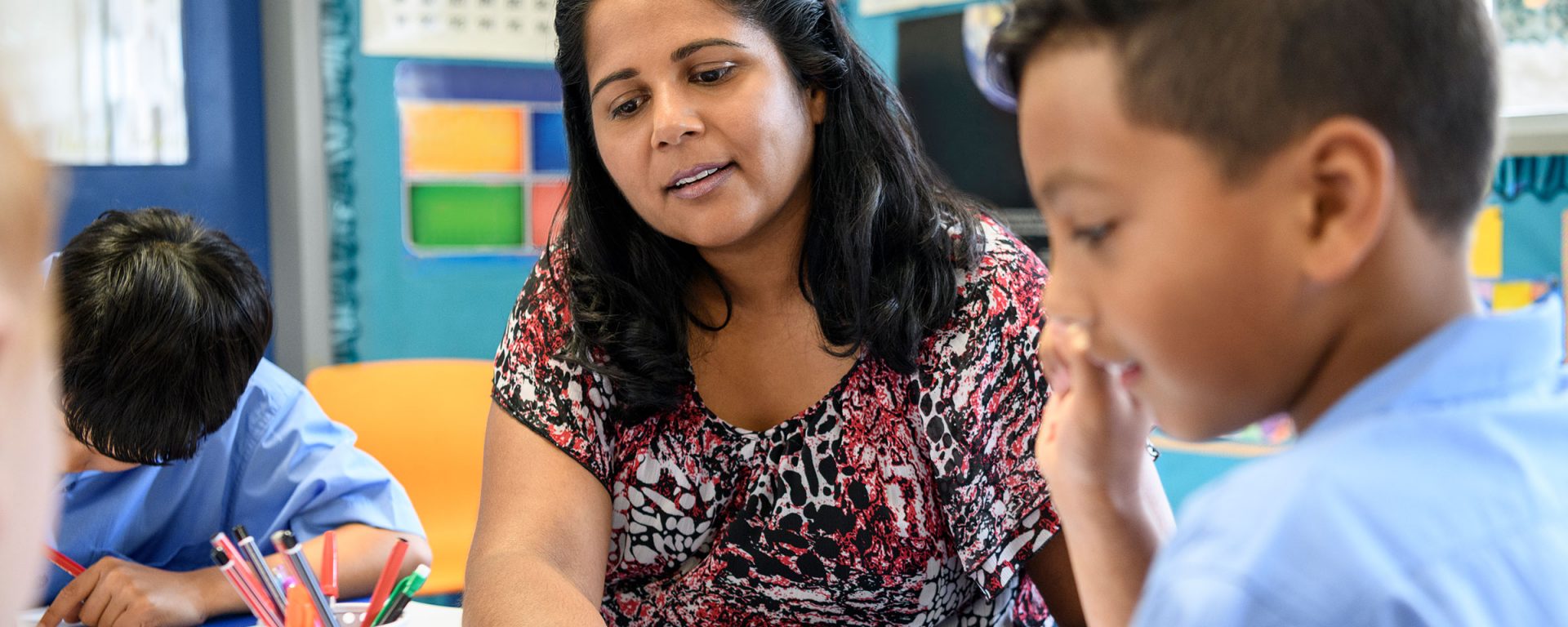One minute, they’re tiny babies, and the next thing you know, you’re filling out primary school enrolment forms. If your child is about to make their kindergarten (a.k.a. ‘big school’) debut and you’re feeling a little overwhelmed – we’ve got you! Our ultimate kindergarten checklist and words of advice from an experienced teacher (and super mum of four) have everything you – and your little one – need to start their primary school journey strong.
Kindergarten checklist – teacher tips

After being a long daycare, preschool and school teacher for 20 years and sending her four children to school – the youngest just last year – Dr Belinda Downey, Lecturer in Education at Charles Sturt, has learnt a few things about the transition to school. Here are her best teacher tips to start kindergarten strong!

Teacher tip #1: Put on a brave face
“As parents, we often feel anxious and worried about our little ones. But we need to put on a brave face for them. If you seem scared of your child going to school, your child will feel it too. So encourage your child’s excitement by being excited for them. This is especially important if your child is hesitant. Keep reminding them of the fun they will have, the friends they will make and the new things they will learn. Perhaps point out other things that were once tricky for them but that they now love, such as swimming, dancing or riding their bike, to remind them that they can do tricky things.”

Teacher tip #2: Carry a little piece of home
“Each of my children had something small that they took to school that they could hold when they felt worried or missed me. Two of my children selected a small, polished rock that I put a kiss on. They kept these in their pocket and could hold them when they felt worried. Another child had a necklace with a rainbow on it that she would hold. My youngest had a love heart drawn on her hand that she could rub and look at if she felt sad. A great book for children with separation anxiety is Invisible Strings by Patrice Karst. It talks about the invisible strings that connect our hearts when we are not together, it is a great book to add to your kindergarten checklist.”

Teacher tip #3: Practice makes perfect!
“If your child is attending long daycare or preschool, begin encouraging them to pack and unpack their belongings and how to take care of their things. You can also do this for outings to help get some practice in. We practised what we could take in our bag and what might be safer to leave at home, such as special toys that we would be sad if we lost.”
Your kindergarten checklist could include practising the following.
- Opening and closing lunchboxes and drink bottles.
- Opening food wrappers, e.g. muesli bars and yoghurts.
- Putting on and taking off socks, shoes, jumpers and coats.
- Zipping and unzipping school bags.
- Holding hands in the car park and waiting at the pedestrian crossing.

Teacher tip #4: Establish a routine
“I made a picture/photo routine as part of our kindergarten checklist, reminding my children of what they needed to do: get dressed, eat breakfast, brush their teeth, pack their lunch, get their shoes, and be ready to leave. This gave my children some autonomy as well as a visual reminder of what we needed to do to get out the door on time.
“My children had to catch a bus to and from school to out-of-school hours care (OOSHC). So before kindergarten, we practised driving the bus route so they could spot when they were getting close to home or school and what to do if they missed the bus or the bus spot.”

Teacher tip #5: Social and emotional prep
“As a preschool teacher, my kindergarten checklist for my preschoolers was focused on encouraging the social and emotional preparation of transitioning to school. I believe children heading to kindergarten need to have the confidence to say to a teacher: I need the toilet, I feel unwell, or I have hurt myself.
“At preschool social and emotional preparation occurred when engaging with the children during play to role-model and encourage them to find a solution. For example, if we were playing a game where turn-taking was needed, we would play the game with the children and model how to take turns.”
- Encourage your child to engage in different activities in small groups to practice turn-taking with talking and sharing; once they can do this, practice turn-taking in larger groups.
- Support your child to practice asking others to play with them or if they could join in with the game.
- Role-playing games are a great addition to your kindergarten checklist, as you can even do this on short drives in the car. Role-playing with your child can support them in practicing how to ask another child for some space in a kind way or ask for help from a teacher.

Teacher tip #6: Build that confidence
“Building your child’s confidence is really important to have on your kindergarten checklist so that your child is able to voice their needs in an appropriate way.
“Organising play dates with children going to the same school can also help support your child to feel confident as they know who they will see at school. Long daycare and preschools often have lists of which children are going to what school.
“Encourage your child’s independence so that they can identify, keep track and look after their belongings. My children could identify their first name in written form (such as a name tag) and write their name. This is helpful for children to be able to do but not essential, if your child cannot write their name, they will learn this at school.
“Ask yourself: Am I ready? Do I feel confident to explain to the school my child’s needs – learning, medical or otherwise. Do I feel confident to stay positive and encourage my child that school will be fun?”

Teacher tip #7: Remember, every child is different
“Preparing your child for school needs to be tailored to the child. Some children need to practice speaking up, while others need to practise listening, taking their jumper on and off, or maybe remembering they had a jumper. Each child is different, and the skills they are still learning will also be different.” All parents should remember that there is no perfect kindergarten checklist for school readiness – we often feel a lot of pressure to have our child ready for school, but all children have strengths and weaknesses.”

Teacher tip #8: Chat with the professionals
“If your child attends a daycare or preschool, talk to the room leader, teacher and director of the service, they can support your child’s transition. There are a lot of staff at school that can also help, including learning and support teachers and School Learning Support Officers (SLSOs), specialist vision and hearing itinerant teachers, English as an Additional Language or Dialect (EAL/D) teachers, community information and liaison officers, home school liaison officers, Aboriginal education officers and the Aboriginal Education Committee.”
“Even as a teacher myself, I still felt unsure about my role as the parent within the school. I wish I had realised sooner that I know my children best. And that it is okay for me to voice the concerns I have for my children in a professional and respectful way with the school. What is best for my children’s learning is the school and I working together.”

Teacher tip #9: Bracing for the big first day
“All of my children had different transitions. My oldest and youngest were very excited to start school and happy to go. My middle children (twins), however, were very anxious, and there was also some separation anxiety and tears about starting school.
Part of my kindergarten checklist was to discuss my children’s hesitation with the school before their transition days, and the school helped to develop a transition plan so that my children had the same teacher for transition as they would for kindergarten. The teacher went out of their way to talk to my children every time we visited the school, which made my children feel comfortable and confident. The school teacher also came to visit my children at their preschool, which helped my children feel familiar with the school and the teacher before starting.
I also discussed the transition plan with my children’s preschool. The preschool had pictures of the school and discussed the school and the teacher with my children on a regular basis. The preschool also discussed what might be exciting to do at school. By the time we ticked off the last item on our kindergarten checklist, they were both ready to go with no tears in sight (except maybe mine)!”
Kindergarten checklist – things you can do before school starts
- Orientation: Attend kindergarten orientation at your child’s school. This is your child’s chance to get familiar with the school, their new classmates and teachers.
- Get informed: Read through the school’s enrolment pack and ask any questions.
- Save the date: Find out the Term 1 start date. Important dates are usually outlined on the school’s website.
- Forms: Complete and return enrolment documents to the school. If your child has special needs or medical conditions, inform the school ASAP.
- Health check: Ensure your child’s immunisations and health records are up-to-date.
- Care arrangements: Look into out-of-hours care options early. Most schools offer OOSHC for primary school children.
- Drop-off and pick-up: Discuss before and after school drop-off and pick-up routines with your child. Make sure both your child and the school know the arrangements you decide on.
- Dress rehearsal: Before the much-awaited first day, put a dry run of the morning school routine on your kindergarten checklist – and do it. Yes, this means getting fully kitted out in their new school uniform, breaking in those school shoes and practising getting ready in a somewhat timely fashion.
- Back to basics: Show your child how to pack and unpack their school bag.
- Label your child’s belongings. And we mean label everything! From school hats and bags to lunch containers and drink bottles. A legible waterproof name label won’t prevent your child’s things from going astray in those early days of school.
- Support your child to use the bathroom independently and practise good hand hygiene.
- Talk about your child’s transition to school. If your child attends preschool or early childhood care, talk to the educators to get personalised advice about your child’s transition to primary school.
Start a learning journey of your own

Thinking about a career in teaching? Here are five reasons why you should go for it! Whether you’re interested in early childhood education or primary or secondary teaching, you can check out our full range of education and teaching courses to find the perfect fit for you.
Or, if you’ve been inspired to continue lifelong learning, check out our full range of short courses to full degrees – to find the perfect course to start, change or advance your career.


You must be logged in to post a comment.